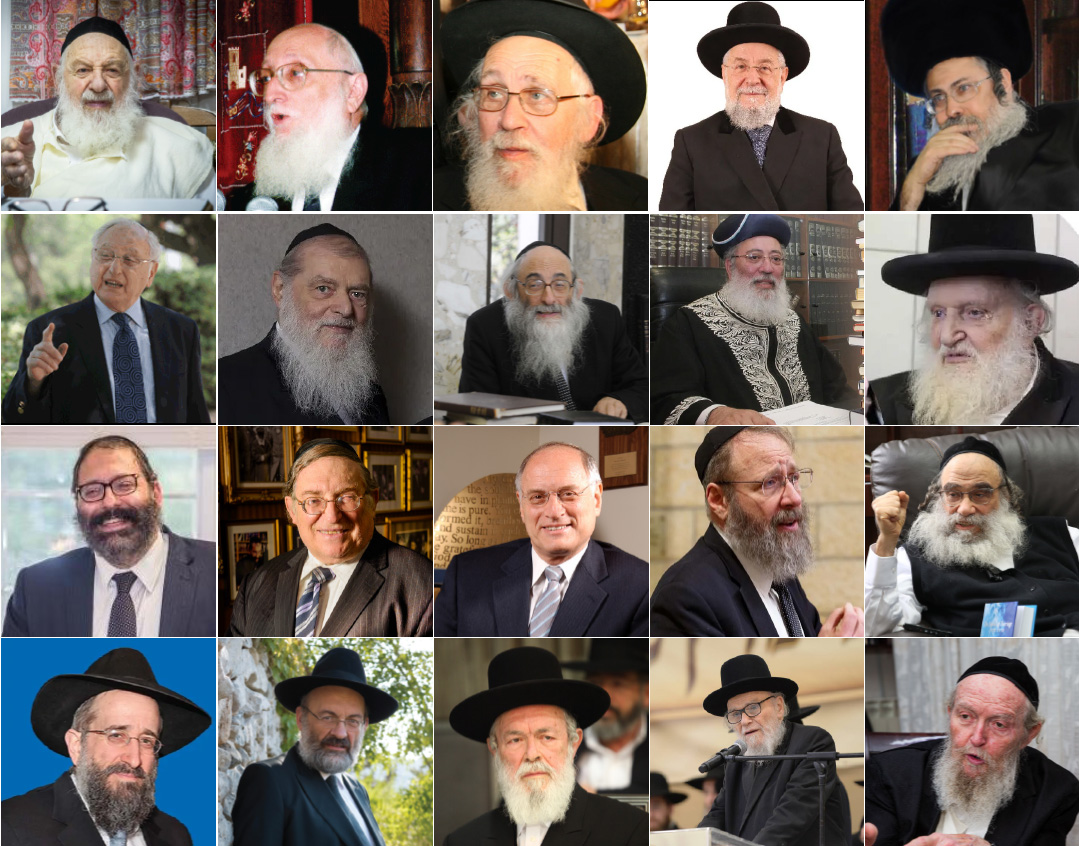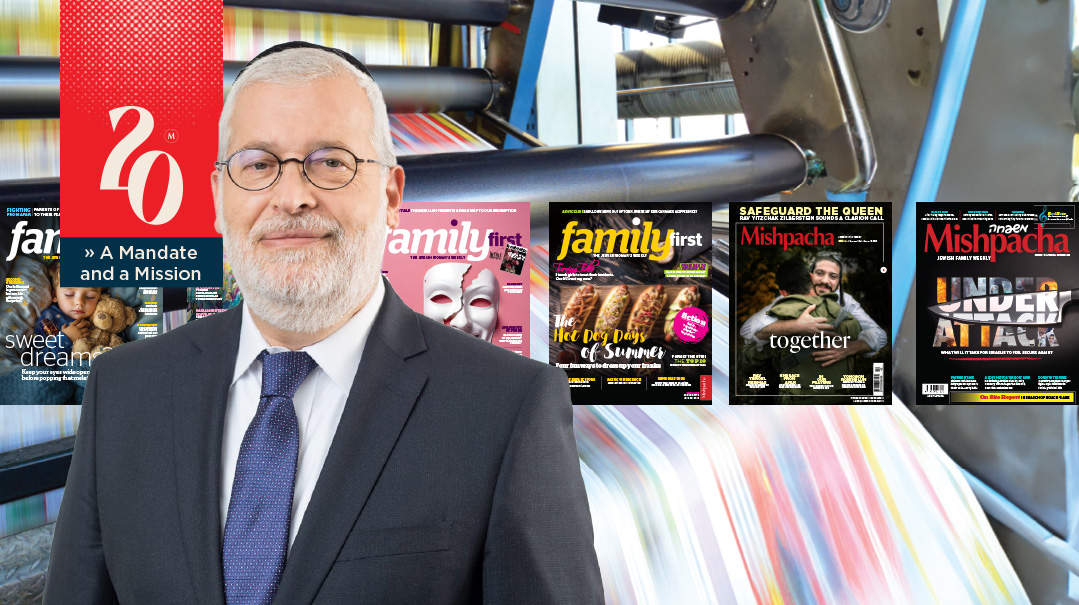Privileged Perspectives

Perhaps the greatest privilege of working at Mishpacha is the opportunity to speak with the leaders of our community

Perhaps the greatest privilege of working at Mishpacha is the opportunity to speak with the leaders and elder statesmen of our community and relay their insights to the broader readership. Over the years, we’ve been fortunate to serve as a most elevated medium for these invaluable conversations, and the words of wisdom still endure
Imagine you’re suddenly hit with the truth, in one instant, like a big boom. Then you spring it on your children without any preparation: “Do this! Don’t do that!” Boom!
That’s what happened when I became religious — my son was ten, my daughter, eight. They weren’t babies anymore and here I was springing this on them. It was hard for them.
Then suddenly I caught on: “Excuse me, Uri, didn’t Hashem wait for you until you turned forty? Hashem even gave Rabi Akiva until the age of forty. It must have been that, in Heaven, they knew you weren’t ripe for change. So what do you expect of your kids?”
That’s why I tell parents to learn to wait. Don’t worry where your child is holding. Sometimes the right thing to do is nothing. Just give him lots of love.
—Rabbi Uri Zohar ztz”l, Issue 8
The secular press has one intention in mind, and that’s how to get the most people to buy their publication and how to entertain them in the worst possible way. The purpose of chareidi journalism is what can be done and what has to be done to improve communal life.
—Rav Mendel Weinbach ztz”l, Issue 54
I spent the war years with my parents and siblings, where we hid in one room for three years straight. We had a Gemara Kesubos and a Mishnah Berurah, cheilek gimmel. We were forbidden to go near the windows. We had contact with no one. The brutal European winters penetrated our bones. A minyan didn’t even come into question. We had nothing to do but sit and learn the seforim that we had.
After liberation, I arrived at the port near Marseilles, France. It was Shabbos when they announced to our group of refugees that there was a ship leaving for Eretz Yisrael. They told us it was our only opportunity to reach Eretz Yisrael. I had no idea of what was happening in the world, and there were grounds to suspect that it was an issue of pikuach nefesh, so I allowed myself to go. On the way to Eretz Yisrael, I took upon myself a vow that if Hashem would give me the merit to reach Eretz Yisrael, I would write a sefer that would glorify the honor of Shabbos.
That promise resulted in my sefer Shemiras Shabbos k’Hilchasa.
—Rav Yehoshua Neuwirth ztz”l, Issue 47
We must erect walls around our children. We live in a wanton generation, with a tremendous lack of tzniyus and an abundance of apostasy and heresy and if we do not protect our homes, we could chalilah lose our children. But if the area inside those walls is not filled with stimulation and happiness and joy, no wall in the world can guarantee that the youngster will thrive.
—Rav Asher Weiss, Issue 114
When I leave my house every day, on one side of the door is the mezuzah; on the other side is the photograph of me as a small child, leaving Buchenwald. Each time I see it, it silently tells me, “Yisrael, your task is to justify the fact that you were saved. You must carry out your parents’ mission; you must keep the chain unbroken. This is from whence you came.” And across from the photo, the mezuzah reminds me before Whom I’m destined to give an accounting.
—Rav Yisrael Meir Lau, Issue 118
This is not the largest Torah community in the country, but it’s one of the nicest, because they are all growing, perpetually growing. I am awed by the commitment and dedication of our people here…. My father ztz”l had this incredible ayin tovah, an ability to find the good points in all people. I have it much easier; I am surrounded by people who are constantly growing. Of course I love them.
—Rav Michel Twerski of Milwaukee, Issue 196
A child must feel that his father is willing to lose out on a big business deal so as not to miss a single Torah shiur. If a child doesn’t get that sense, then even if he sings “Tov Li Toras Picha” 300 times a week, if he knows in his heart that his father can’t pass up the deal, then that message will forever remain a song and not a lifestyle.
—The Tolna Rebbe, Rav Yitzchak Menachem Weinberg, Issue 84
G-d has not declared bankruptcy in the past, nor will He declare bankruptcy in the future. We have an old Father, the Chasam Sofer said, who has never changed, nor will He ever change.
—Rav Aharon Teitelbaum of Satmar, Issue 254
In the dreadful concentration camps, we were ready to give away our last crumbs. Today, when the entire Jewish nation is still in danger, we certainly must love each Jew and be prepared to give everything for his sake.
—The Kaliver Rebbe, Rav Menachem Mendel Taub ztz”l, Issue 139
The major problem that exists in the Jewish world today is the problem of identity. People don’t know who they are and what’s expected of them. They don’t know where they’ve been and where they’re going.
—Rabbi Berel Wein, Issue 166
Rav Koppelman asks me to sing “Kol Dodi Dofek,” attributed to Rav Boruch Ber, and the Skulener Rebbe asks me to sing “Ki Hamitzvah Hazos” whenever I’m there. I always tell my children that you get a lot more kavod from the experience of singing for one of these people than performing in front of 30,000!
—Reb Abish Brodt, Issue 180
The Maharal of Prague has a sefer on Eichah and he calls it Netzach Yisrael. He doesn’t call it Aivel (the mourning of) Yisrael, he calls it Netzach – the eternity – of Yisrael. The Holocaust too, is in some way a sign of the eternity of the Jews. We are the only people that someone says must be wiped off the face of the earth…so the message is that we cannot take care of ourselves. That we need siyata d’Shmaya in all situations.
—Reb Yosef Friedenson z”l, Issue 97
When I started in kiruv, people would point with their finger and say: there goes Reb Noach, the meshugeneh. The dreamer. When you start something new everybody says you’re crazy. When you’re halfway successful they say: I knew it all along. You know when you’re really successful? When they say: I can do it better than you. Baruch Hashem, today they all know how to do it better than me.
—Rav Noach Weinberg ztz”l, Issue 211
My parents and others in their generation who barely had enough money to meet their expenses always somehow managed to save money each month. Today, it’s the other way around. People who have more money than they need somehow manage not to save.
—Rav Yitzchok Sorotzkin, Issue 378
The Jews remain totally alone in our unique identity. Even today, we do not share a natural solidarity with any other nation — we belong to no pact of nations, are not full members of any economic bloc, and belong to no regional grouping at the UN. We are forever the odd state out in the family of nations.
—Ambassador Yehuda Avner z”l, Issue 324
In the ways of Chassidus, there is no partition dividing a ben Torah from a baal bayis. Every Jew who observes Torah and mitzvos, and sets aside times for learning, and raises his children to observe Torah and mitzvos, is considered a ben Torah.
—The Munkatcher Rebbe, Rav Moshe Leib Rabinovitch, Issue 229
A rav has to realize that speaking honestly and making demands from his balabatim isn’t insulting them. It’s a compliment. It means he respects them enough to care.
—Rav Noach Isaac Oelbaum, Issue 371
In today’s world, you can train a person’s mind from age 18 to 22. If I don’t train a person to think through a masechta then, I’ve lost him; he’ll never know what it means to think through a masechta.
—Rav Moshe Meiselman, Issue 386
Of course the world of frum Holocaust victims had its heroes. There was a cheder in the Warsaw Ghetto, and the rebbi was teaching parshas Toldos, this at a time when the Nazis would shoot anyone caught teaching Torah. A small child in the classroom raised his hand and said, “The Nazis are Eisav, and we are Yaakov. I want to be Yaakov.” He saw what was going on outside, yet he chose the path of Yaakov. That tells us so much about real heroism!
—Rabbi Nosson Scherman, Issue 317
From our special-needs brother Shimmy, we knew early on that it’s an imperfect world. But from seeing the way my parents handled it, we learned that we still have to strive for perfection.
—Reb Aba Dunner z”l, Issue 261
We were two broken people. My father had lost everything — his wife and daughter, his chassidim, and the only world he knew. I had lost my father and entire extended family, a young bewildered orphan when he came in to my life. We healed from each other; is it any wonder that we became one?
—Rav Tzvi Spira ztz”l, The Bluzhever Rebbe, Issue 278
I was at an event this week and a friend remarked that those things that remove a person from this world start with the letter chaf: kesef and kavod, money and honor. I told him that I had another example: kisei. The seat of rabbanus is just as dangerous.
—Rav Shlomo Amar, Issue 406
The worst thing to do is to look down at the world; every generation has its own challenges, virtues, and faults. You cannot accomplish with people you look down on.
—Rav Yisroel Belsky ztz”l, Issue 454
Schools are like medical clinics. Just as a medical clinic cannot pick and choose which patients to treat, a school may not establish selection criteria for its students.
—The Gaavad, Rav Yitzchak Tovia Weiss ztz”l, Issue 505
Yichus isn’t an automatic ticket, but it gives a person certain kochos. It can be a problem, though, because along with this spiritual energy comes obligation.
—The Gaavad, Rav Moshe Sternbuch, Issue 607
You have to belong. Yiddishkeit thrives when you’re a part of something. If a person isn’t attached to a chassidus, a yeshivah, or an organization, then he’s lost.
—Reb Benzion Fishoff z”l, Issue 440
I accept that people can change: we can try to be more accessible, more pleasant, more understanding. But the Torah doesn’t change. If I have a mantra, it’s Ani ma’amin b’emunah sheleimah shezos haTorah lo tehei muchlefes. It’s not happening.
—Chief Rabbi David Lau, Issue 554
You have to love the speaking that you do. Only do it if you love it, if it excites you. You can’t do this just to put bread on the table. If you are in it with all your heart and soul, if you have inspired yourself and you’re passionate about each message and each story, that passion will reach your audience.
—Rabbi Paysach Krohn, Issue 607
My brother and I were in the car when my father was pulled over for speeding. The police officer said, “I see you have children in the back, so I’m going to let you off with a warning.” My father didn’t hesitate: “Give me a ticket. I have two children in the car. I don’t want them to see that you can break the law and get away with it.”
—Rabbi Dr. Dovid Gottlieb, Issue 662
Our youth needs experiential Yiddishkeit. They yearn for an intimate relationship with Hashem. No slogans, no PR, no social conformity. They want raw truth. They want to feel G-d in their kishkes.
—Rabbi YY Jacobson, Issue 593
Don’t say what you shouldn’t; don’t go where you shouldn’t; don’t distort your views to make them more palatable to others. Some will say that your code of social conduct puts you at a lobbying disadvantage. The exact opposite is true. Torah adherence helps you in your work. Government officials want Jews to be Jewish.
—Rabbi Abba Cohen, Issue 607
Rebbe Nachman of Breslov gave his people a gift: we will never become arrogant or haughty. You know why? Because by us, even if someone has a really good Shemoneh Esreh, or learns an intense seder, someone else in shul will say, “Big deal, he’s not normal, he’s Breslov.” It keeps you humble.
—Reb Mota Frank, Issue 631
Despite Abba’s advanced age, he totally “got” the difficulties of this generation. His guidance to educators was never to become angry, and not to react with harshness. Abba believed that shouting at a child can kill his soul. If the rebbi shouts at a child for coming late, he’s ruined his day and taken away any cheishek he might have had to learn.
—Rav Shraga Steinman, Issue 694
It’s not headlines that make Jewish power, it’s credibility. Leaders have to believe in the authenticity of your arguments, the legitimacy of the case you make — and you don’t make claims you can’t fulfill.
—Malcolm Hoenlein, Issue 708
When we were considering the move to Philadelphia, there was some concern about chinuch, about the fact that there weren’t many families like ours, but Rav Aharon Kotler gave us a havtacha, an assurance: If you do for the Eibeshter’s kinder, He takes care of your kinder. You don’t lose out. The Ribbono shel Olam pays back.
—Rav Shmuel Kamenetsky, Issue 781
Every parent of yeshivah children and more broadly, every single community member, has to feel that the threat to the yeshivos is their tzarah, their struggle.
—Rav Elya Brudny, Issue 740
Do you know what the problem was with Amalek? Do you know the real taineh on Amalek? He cut off all the stragglers at the rear. Amalek “cut off” — meaning, he mocked and disdained — the stragglers, he didn’t see the glory of the noshrim, the shababnikim, the ones off the derech and at risk. He didn’t see who they really were. He didn’t see the beauty of a Yiddishe neshamah.
—Rav Yaakov Meir Shechter, Issue 806
Not every working ben Torah will walk down the street thinking in learning, but at the very least, he should have what to think about in learning. The connection has to be vibrant, and then, when there are challenges, that early foundation of Torah becomes a reservoir supplying him with clear water. That’s what it means that Torah accompanies you “v’lechtecha baderech.”
—Rav Yosef Elefant, Issue 750
It is important that we successfully navigate the world of American politics. There are many issues that can help or hinder our continued success. But no candidate or party represents Torah values. A Torah Yid has no business identifying with either party. The world of politics is an environment alien to a Torah Yid, and never do our emotions or neshamos belong in that world.
—Rav Aaron Lopiansky, Issue 844
I never wanted to buy my wife flowers, they seemed like a bad investment to me, not cheap, and they don’t last that long, and once they start to wilt you have to get rid of them. For what? Spend the money on something practical, I thought. But then I realized that ha gufa, because they’re not practical and have no function, that’s why they express an emotion so well….
—Rav Reuven Feinstein, Issue 830
When Esther pleaded for her nation, she said, “Ki eichacha uchal v’ra’isi… how can I bear to see the destruction of my people, and how can I bear to see the destruction of my family?” I am not okay if my People are not okay, she was saying, and if you want me to be happy, then they must be happy as well. The tzaddik feels the tzaros of other Yidden so acutely that he turns to Heaven and cries, “How can I bear it? Please have mercy on my family!”
—Rav Gamliel Rabinowitz, Issue 854
You can live in Bnei Brak or Jerusalem and still endure challenges raising the children properly, and you can live among non-Jews in Toronto, London, or New York, and raise children who are yerei Shamayim. The physical location is a minor part of parenting. The emphasis must be on the inside: the constant effort to create a solid Yiddishe home, built on the foundations of Torah and kedushah. That’s the source of it all.
—The Rebbe of Sanz-Klausenberg, Issue 757
People can be rich and frum. But people’s hearts can only be invested in one at the cost of the other. Today, because of the strange economic environment, people can become rich very quickly. But the concern is not the actual wealth so much as the focus on the wealth. There are priorities in life. The more you put your heart and soul into worrying about your portfolio, the less you invest your heart and soul into being able to serve HaKadosh Baruch Hu.
—Rav Yisroel Reisman, Issue 878
There’s a need to see to it that Jews know how to talk to one another. True, we shouldn’t sacrifice our values for the sake of peace. But we can learn to love people we disagree with. We know that human beings’ philosophies don’t sprout in a vacuum. When you hear hostility or animosity, that’s an expression of an underlying fear. Understand that. Feel for them.
—Rav Yitzchak Berkovits, Issue 981
My father-in-law, Rav Elyashiv ztz”l, used to say that the Torah is called a song because it must be sweetened with song — meaning through stories, riddles and meshalim. Through the sweetness, the Torah is absorbed.
—Rav Yitzchak Zilberstein, Issue 956
Hashem doesn’t need the aid of any nation, ammunition, or army. If America doesn’t help the Jews in our time of need, Hashem will find a different way to save Klal Yisrael from destruction, as he has done throughout the generations when they tried to destroy us.
—Rav Moshe Wolfson, Issue 982
We’re experts in getting kids to perform. They learn long hours, master large amounts of material, and keep halachah stringently. But is that really our job in chinuch? Are we just Torah coaches, trying to help our kids win a gold medal? We have to show our children and students that we’re interested in them, not just in their accomplishments. Otherwise, we’re missing something basic about chinuch, and about Torah itself.
—Rav Reuven Leuchter, Issue 973
So often, we give our children a sense that Yidden are Yidden because we have a different lifestyle, we have a different set of rules with which we live. But that description misses the essence of our unique mission. Yidden are Yidden because we have the capacity to become completely bound to the Ribbono shel Olam.
—Rav Uri Deutsch, Issue 962
It is told that a Jew far from Yiddishkeit once entered the Mirrer Yeshivah during Minchah. Later, they asked him what he saw. “A whole room of people praying,” he said, “and one old man talking to someone.” That “one old man” was Rav Yerucham Levovitz — and he was talking to Hashem. That’s what increasing tefillah means: turning tefillah into a conversation with Hashem.
—Rav Moshe Hillel Hirsch, Issue 986
There’s an ironclad rule in this world: There exists an inverse relationship between the size and luxuriousness of a dining room, and the intensity of Torah that it contains.
–Rav Michel Zilber, Issue 978
(Originally featured in Mishpacha, Issue 1008)
Oops! We could not locate your form.







